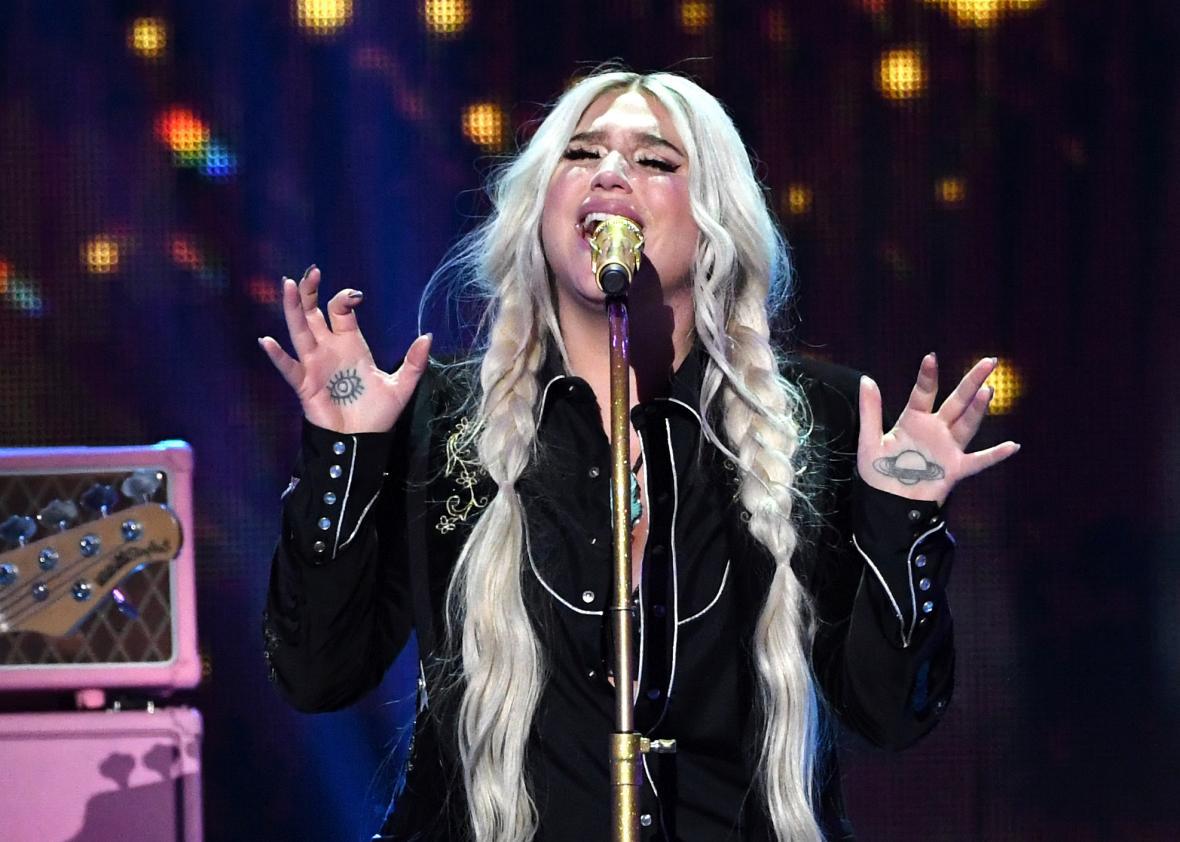Kesha’s breakthrough single “Tik Tok” was a piece of bubble gum that never lost its snap, a timeless, mildly generic ode to partying nonstop. But its chorus has acquired a sharper taste in retrospect, particularly the part where she pledges “Tonight, I’m-a fight ’til we see the sunlight.” Kesha co-wrote “Tik Tok,” like most of the songs on her first two albums, 2010’s Animal and 2012’s Warrior, with Lukasz Gottwald, the writer-producer known professionally as Dr. Luke, whom she accused in a 2014 lawsuit of drugging and raping her, as well as subjecting her to years of emotional abuse. (Gottwald has denied all charges and countersued for defamation.) The idea of the dance floor as a battlefield, of music as a means of not just escape but survival, no longer seems like just a metaphor.
It’s especially cruel that the dispute kept Kesha in musical limbo for nearly five years, preventing her from recording and releasing the songs she was writing about her personal trauma and threatening her ability to make a living as well. But when her Rainbow finally arrived in August, it went to No. 1 on Billboard’s album chart, an especially impressive achievement for an album that doesn’t contain anything resembling a contemporary pop single. Instead of an ode to all-night clubbing, the first song she released was “Praying,” a gospel-tinged anthem that directly addresses an unnamed abuser. Its production, by Ryan Lewis, is almost startlingly spare compared with Dr. Luke’s, especially where Kesha’s vocals are concerned: We’re literally hearing her voice for the first time. When she played the song on The Tonight Show, she appeared to be near tears, and after the last word had been sung, she let out a gasp, as if years’ worth of anguish was leaving of her body in.
Rainbow has faded from the top of the charts, but I’ve been coming back to it for months. The hard-earned catharsis of “Learn to Let Go” is a pointed contrast to the tit-for-tat recrimination of pal Taylor Swift’s “Look What You Made Me Do,” another song that, at least in its video, alludes to being the victim of sexual assault. (Swift won her own lawsuit and appears in the video with the $1 she won from the DJ who groped her.) And as Harvey Weinstein’s alleged victims have flooded the news, it’s made all too vivid the particular vileness of sexual harassment and abuse in industries where vulnerability and emotional openness is a job requirement. (Kesha, incidentally, is not out of the woods. Notwithstanding Sony’s dissolution of its corporate relationship with Dr. Luke, she is still contractually bound to him, and the judge assigned to her lawsuit remains extraordinarily unsympathetic to her claims.)
Perhaps Rainbow’s greatest triumph is how Kesha holds onto that vulnerability, whether offering her abuser the chance to atone on “Praying,” or allowing herself the goofy dalliance of “Godzilla,” a song about taking a kaiju home to meet your parents. When I saw Kesha perform the latter at Philadelphia’s Fillmore two Saturdays ago, she brought out her mother, Pebe Sebert, to sing it with her. But before the music started, Pebe thanked the crowd for “keeping my daughter alive.” It felt like everyone who was in the audience understood that was part of why they were there, finally able to do more than tweet a #FreeKesha hashtag or add their name to a symbolic online petition. When Kesha began an introduction with “You know I’ve been through a lot the last few years …” the crowd roared—of course we knew.
The performance, which was captured by a film crew led by Kesha’s brother, leaned heavily on songs from Rainbow, with a few of her early hits, including “Tik Tok,” sprinkled among them. She lifted the wordless chorus from “Timber” and grafted it onto the end of the country barnburner “Hunt You Down,” rescuing the former’s killer hook from a recording in which Pitbull raps about liking women “face down, booty up.” At the end, she sent us out into the night with Rainbow’s “Bastards,” a defiant hymn that shares a motto with The Handmaid’s Tale. But the moment that sticks with me most was from earlier in the show, during “Learn to Let Go.” The song starts with her as “a prisoner of the past,” consumed by bitterness and anger. But as she moves into the chorus, Kesha finds a way to release that pain, and it’s by taking her own advice—in effect, by listening to her own music. “I know I’m always telling everybody you don’t gotta be a victim,” she sang. “I think it’s time to practice what I preach.” If no one else was going to free Kesha, she would do it herself.
As “Learn to Let Go” built to that conclusion, the idea that “Life ain’t always fair, but hell is living in resentment,” the band picked up behind her, as if urging her onward. Her backing singers, dressed in stoic black suits with a hint of glitter at the neck, broke free from their microphones and spun around the stage, and as the chorus started in earnest, they joined forearms and skipped like children on a playground. In the middle of the pain, there was so much joy.
